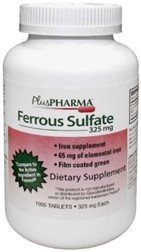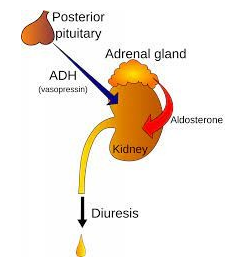An older adult with iron deficiency anemia is being discharged with a prescription for ferrous sulfate enteric-coated tablets. To promote the best absorption of the medication, which information should the nurse include in the discharge instructions?
Take a tablet with a daily multivitamin.
Crush the tablets and mix with pudding.
Bedtime is the best time to take the tablet.
Wait for 2 hours after meals to take the tablet.
The Correct Answer is D
Ferrous sulfate is best absorbed on an empty stomach. The nurse should instruct the client to wait for 2 hours after meals before taking the tablet to promote the best absorption of the medication. The client should also be advised not to crush the enteric-coated tablets as this can affect the medication’s effectiveness.

Nursing Test Bank
Naxlex Comprehensive Predictor Exams
Related Questions
Correct Answer is A
Explanation
Lithium carbonate is a mood stabilizer commonly used to treat bipolar disorder. However, it has a narrow therapeutic index and requires careful monitoring of serum levels to avoid toxicity. One of the major concerns with lithium therapy is the potential for drug interactions and toxicity. NSAIDs such as ibuprofen and naproxen can increase lithium levels by reducing its excretion and can lead to lithium toxicity. Therefore, it is essential to instruct the client to eliminate the use of NSAIDs while taking lithium.
Option b) Avoid consuming all foods that contain iodine is incorrect because iodine is not contraindicated with lithium. However, excessive iodine intake can interfere with thyroid function, which can exacerbate mood instability.
Option c) Notify healthcare provider prior to dental procedures is not specific to lithium therapy and is a general precaution that patients with bipolar disorder should follow before any medical or dental procedures.
Option d) Monitor blood glucose levels daily is also not directly related to lithium therapy. While lithium can cause diabetes insipidus, which can lead to excessive thirst and urination, it does not typically affect blood glucose levels.
Correct Answer is C
Explanation
Diabetes insipidus is a condition in which the kidneys are unable to conserve water, leading to excessive thirst and urination. It is treated with antidiuretic hormone (ADH), which helps the kidneys retain water and reduce urine output. When caring for a client with diabetes insipidus who is receiving ADH intranasally, it is important for the nurse to monitor the client’s serum osmolality.
Osmolality is a measure of the concentration of particles in a solution and can provide information about the client’s hydration status.
Monitoring serum osmolality can help determine if the ADH therapy is effective in managing the client’s diabetes insipidus.

Whether you are a student looking to ace your exams or a practicing nurse seeking to enhance your expertise , our nursing education contents will empower you with the confidence and competence to make a difference in the lives of patients and become a respected leader in the healthcare field.
Visit Naxlex, invest in your future and unlock endless possibilities with our unparalleled nursing education contents today
Report Wrong Answer on the Current Question
Do you disagree with the answer? If yes, what is your expected answer? Explain.
Kindly be descriptive with the issue you are facing.
